Introduction
When a storm strikes, the aftermath can be overwhelming. From fallen trees to debris scattered across your property, the cleanup can quickly become a daunting task. Understanding storm cleanup costs is crucial for effective budgeting and ensuring your property is restored to its pre-storm condition. In this guide, we’ll explore everything you need to know about storm cleanup, including the factors that influence costs, and offer tips on how to budget effectively.
What is Storm Cleanup?
Storm cleanup involves the removal of debris and damage caused by severe weather events. This includes tasks such as removing fallen trees, clearing debris, and repairing any damage to your property. Effective storm damage cleanup requires specialized equipment and expertise to ensure a thorough and safe restoration.
Factors Affecting Storm Cleanup Costs
- Extent of Damage: The primary factor influencing storm cleanup costs is the extent of the damage. Minor debris removal is typically less expensive than extensive storm cleanup, which might involve tree removal and significant debris hauling. The more severe the damage, the higher the costs.
- Size of the Property: The size of your property plays a significant role in determining storm cleanup costs. Larger properties will naturally incur higher costs due to the increased volume of debris and the larger area that needs to be cleaned.
- Type of Debris: Different types of debris require different cleanup methods. For instance, tree removal and stump grinding are more complex and costly than simple debris hauling. If you need storm damage cleanup in Vancouver, WA, be prepared for varying costs based on the types of debris present.
- Accessibility: The accessibility of the affected area can also impact costs. If the debris is in a hard-to-reach area or requires special equipment for removal, this can increase the overall cost of the cleanup.
Budgeting for Storm Cleanup
- Get Multiple Quotes : Before starting any storm cleanup, it’s wise to get quotes from several service providers. This will give you a better idea of the average costs and help you choose a reputable company that fits your budget.
- Consider Emergency Storm Cleanup Services: In the event of a major storm, you may need emergency storm cleanup services. These services often come with a higher price tag due to the urgency and immediate response required. Plan ahead and set aside a budget for such emergencies to avoid financial strain.
- Factor in Additional Costs:
Besides the basic cleanup, there might be additional costs such as repairs to damaged structures or landscaping restoration. Make sure to include these potential expenses in your budget. - Insurance Coverage: Check with your insurance provider to understand what storm cleanup costs are covered under your policy. Some policies may cover a significant portion of the costs, which can help reduce your out-of-pocket expenses.
First-Hand Experience: Handling Storm Cleanup
Having dealt with numerous storm cleanup projects, we’ve seen firsthand how costs can vary. For instance, after a severe storm in Vancouver, WA, we had to manage a large-scale cleanup that included removing several large trees and hauling away extensive debris. The total cost was higher than expected due to the sheer volume of work and the specialized equipment needed. However, with proper planning and budgeting, we were able to handle the project efficiently and restore the property to its original condition.
Tips for Efficient Storm Cleanup
- Act Quickly
The sooner you begin cleanup, the less damage you’re likely to incur. Prompt action helps prevent further complications and additional costs. - Hire Professionals
While DIY cleanup might seem like a cost-effective solution, professional storm cleanup services are often more efficient and thorough. They have the necessary equipment and expertise to handle complex tasks safely. - Stay Safe
Safety should be your top priority during storm cleanup. Ensure that you and your team are equipped with the proper safety gear and follow all safety protocols to avoid accidents and injuries.
Conclusion:
Understanding storm cleanup costs and how to budget for them can help you navigate the challenges that come with severe weather events. By considering factors like the extent of the damage, property size, and the type of debris, you can better prepare for the financial aspects of storm cleanup. With proper planning and the right professional help, you can restore your property efficiently and effectively.
FAQs
Q: How much does storm cleanup typically cost?
A: The cost of storm cleanup varies widely depending on factors like the extent of the damage, property size, and type of debris. On average, costs can range from a few hundred to several thousand dollars.
Q: What is the difference between storm cleanup and storm damage cleanup?
A: Storm cleanup refers to the overall process of removing debris and restoring a property, while storm damage cleanup specifically focuses on addressing the damage caused by the storm, such as fallen trees and structural damage.
Q: How can I find reliable storm cleanup services in Vancouver, WA?
A: Look for local storm cleanup companies with good reviews and experience in handling storm damage. Getting multiple quotes and checking references can also help ensure you choose a reliable service provider.
Q: Are emergency storm cleanup services more expensive?
A: Yes, emergency storm cleanup services are generally more expensive due to the immediate response and specialized equipment required.

